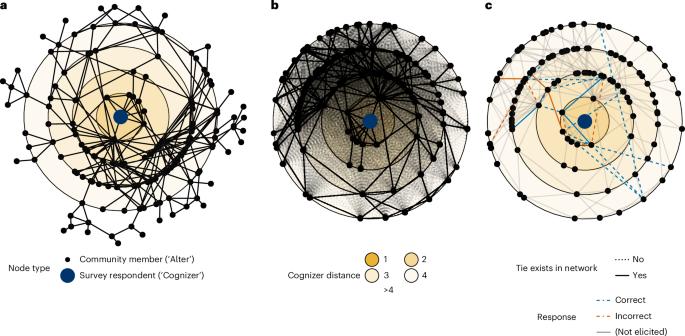孤立村庄社会网络的认知表征
IF 15.9
1区 心理学
Q1 MULTIDISCIPLINARY SCIENCES
引用次数: 0
摘要
人们不仅形成了社交网络,他们还构建了社交网络的心理地图。我们开发了一种抽样策略来评估洪都拉斯82个村庄的10072名成年人的网络认知,并系统地绘制了潜在的村庄网络。在17个村庄,我们还发现了所有1333名居民的遗传亲缘关系。观察者高估了亲属之间的社会互动,对非亲属关系的判断准确度高出33.38个百分点(J)(95%置信区间:31.27-35.49)。与直觉相反,观察者对非亲属配对的看法更为准确,尤其是当观察者是受欢迎的、中年的或受过教育的人时。观察人士不太能够准确判断不同宗教或财富之间的联系。在种植咖啡的村庄里,需要协调努力的个人表现出更大的偏见,认为网络是相互联系的。最后,更准确的受访者能够更好地获取我们通过实验向他们的同龄人介绍的信息。总的来说,人们夸大了他们网络中的连接数量,并表现出不同的准确性和偏见,这暗示了人们如何影响和被社会世界影响。本文章由计算机程序翻译,如有差异,请以英文原文为准。


Cognitive representations of social networks in isolated villages
People not only form social networks, they construct mental maps of them. We develop a sampling strategy to evaluate network cognition in 10,072 adults across 82 Honduras villages and systematically map the underlying village networks. In 17 villages, we also discern the genetic relatedness of all 1,333 residents. Observers overestimate the social interactions among kin and are 33.38 percentage points (J) more accurate in judgements of ties between non-kin (95% confidence interval: 31.27–35.49). Counterintuitively, observers had more accurate beliefs about non-kin pairs, especially when the observers were popular, middle-aged, or educated. Observers were less able to accurately judge ties across different religions or wealth. Individuals in villages that cultivate coffee, requiring coordinated effort, demonstrated greater bias to view networks as connected. Finally, more accurate respondents had better access to information that we experimentally introduced to their peers. Overall, people inflate the number of connections in their networks and exhibit varying accuracy and bias, with implications for how people affect and are affected by the social world. Feltham et al. develop a sampling strategy to evaluate social network cognition across 82 Honduran villages, systematically mapping the underlying village networks.
求助全文
通过发布文献求助,成功后即可免费获取论文全文。
去求助
来源期刊

Nature Human Behaviour
Psychology-Social Psychology
CiteScore
36.80
自引率
1.00%
发文量
227
期刊介绍:
Nature Human Behaviour is a journal that focuses on publishing research of outstanding significance into any aspect of human behavior.The research can cover various areas such as psychological, biological, and social bases of human behavior.It also includes the study of origins, development, and disorders related to human behavior.The primary aim of the journal is to increase the visibility of research in the field and enhance its societal reach and impact.
 求助内容:
求助内容: 应助结果提醒方式:
应助结果提醒方式:


